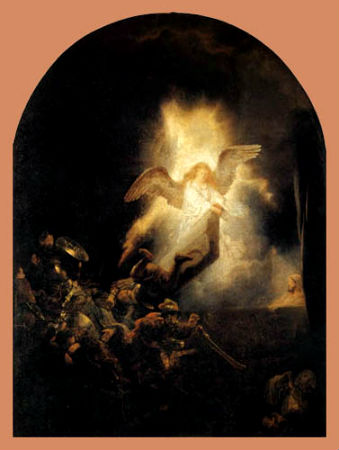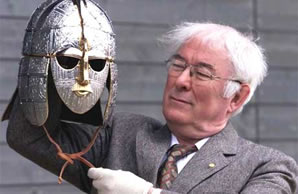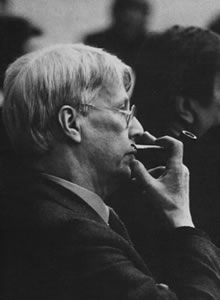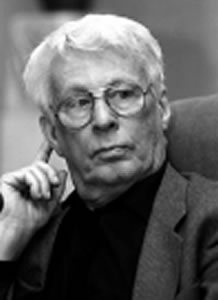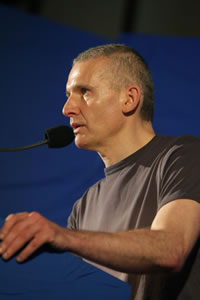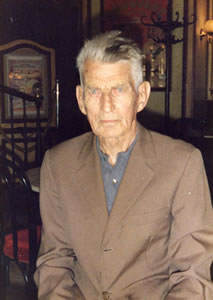Alle bezoekers en mede-bloggers een Vrolijk Pasen!
De opstanding van Jezus, Rembrandt, 1635/39,
Alte Pinakothek, München
Fröhliche Ostern
Ja, der Winter ging zur Neige,
holder Frühling kommt herbei,
Lieblich schwanken Birkenzweige,
und es glänzt das rote Ei.
Schimmernd wehn die Kirchenfahnen
bei der Glocken Feierklang,
und auf oft betretnen Bahnen
nimmt der Umzug seinen Gang.
Nach dem dumpfen Grabchorale
tönt das Auferstehungslied,
und empor im Himmelsstrahle schwebt er,
der am Kreuz verschied.
So zum schönsten der Symbole
wird das frohe Osterfest,
daß der Mensch sich Glauben hole,
wenn ihn Mut und Kraft verläßt.
Jedes Herz, das Leid getroffen,
fühlt von Anfang sich durchweht,
daß sein Sehnen und sein Hoffen
immer wieder aufersteht.
Ferdinand von Saar (30 september 1833 – 24 juli 1906)
De Nederlandse dichter en schrijver Nachoem Mesoelam Wijnberg werd geboren in Amsterdam op 13 april 1961. Zie ook mijn blog van 13 april 2008. en ook mijn blog van 10 april 2009.
Krokussen, hyacinten
De groep meisjes, wedijverend
zacht rijk haar, uitgeleide
van de afgezant (aan haar terugkeer te denken
is misselijk-makend):
Een enkele adem parfum
om haar enkels en hals. Ver weg
brengt de bruidegom zijn
gezicht in de adem.
SU DONGPO
Een gedicht moet over iets gaan; anders kan iemand niet zeggen
of het gedicht overbodig is als hij kan zijn waar het gedicht over gaat.
Wat hij kan zeggen, wat in zijn hart is: een gedicht als het een groter is dan het ander,
teleurgesteld als het geen goed gedicht is.
Een ander kan de woorden die te groot en te klein zijn
vergeten als ballen die hij kort na elkaar hoog in de lucht gegooid heeft,
maar neem hem zijn gedichten af en wat houdt hij over?
Hij wil nog meer gedichten schrijven, genoeg om de halve wereld te vullen.
Nachoem Wijnberg (Amsterdam, 13 april 1961)
De Nederlandse schrijfster, freelance journaliste en columniste Saskia Noort werd geboren in Bergen op 13 april 1967. Zie ook mijn blog van 13 april 2008.
Uit: De Verbouwing
„Ik weet niet wat erger is. Alleen eten in een restaurant vol stellen, of samen maar dan stilzwijgend. Vroeger keek ik vol afgrijzen naar ze. Een man en een vrouw die elkaar niets meer te vertellen hadden. Hoe ze zich, de ogen van elkaar afgewend, door de maaltijd heen werkten, met de fles wijn als reddingsboei. Dat aura van verveling en wanhoop. Twee mensen gevangen in traditie, comfort en rituelen. Waarom zouden ze nog bij elkaar zitten, als de liefde en de interesse voor elkaar zo overduidelijk waren verdwenen? Ik kon ze er uitpikken, de uitgeblusten. Ik zag de dodelijke, geërgerde blikken, het ontwijken van iedere aanraking, ik hoorde ze spreken over elkaar in de derde persoon, het in de rede vallen en publiekelijk vernederen. Daar ben ik trots op, dat ik de pijn en verlangens van andere mensen feilloos herken. Ik zie ze hunkeren, lijden en stralen. Hun onzekerheid en geheimen zijn niet afgeschermd voor mij, hoezeer ze ook hun best doen. Ik weet het, vaak eerder da
n ze het zelf weten.
En nu zit ik hier, in het restaurant waar we wekelijks zitten, en ontwijk ik de blikken van mijn zoon Tom en mijn man Rogier.

Saskia Noort (Bergen, 13 april 1967)
De Nederlands schrijver en schaker Tim Krabbé werd geboren in Amsterdam op 13 april 1943. Hij voltooide in 1960 de HBS-B aan het Spinoza Lyceum in Amsterdam en studeerde enige tijd psychologie aan de Universiteit van Amsterdam. Krabbé was aanvankelijk vooral actief als journalist (onder andere voor Vrij Nederland). Na enige inspanningen werd hij redacteur van het studentenweekblad Propria Cures, waarvan hij ook al gastredacteur was geweest. Al snel werd hij schrijver van beroep. Sinds 1967 leeft hij van de pen. In dat jaar debuteerde hij met De werkelijke moord op Kitty Duisenberg. Zijn romans zijn in zestien talen vertaald. Vier boeken zijn verfilmd. Zijn grootste succes is Het Gouden Ei, dat handelt over de zoektocht van een man naar het lot van zijn vriendin die spoorloos verdwijnt bij een Frans benzinestation. Het boek werd verfilmd door George Sluizer. Spoorloos, naar Het gouden ei won het Gouden Kalf 1988 voor de beste Nederlandse film. Krabbé’ schrijft poëzie, romans, novellen, korte verhalen, columns, essays en biografieën. Van 1967 tot 1972 behoorde hij tot de beste twintig schakers van Nederland. Hij heeft een aantal schaakproblemen geanalyseerd en studies daarover gepubliceerd.
Uit: Het gouden ei
„Als ze mochten blijven zouden ze morgenochtend zo vroeg mogelijk weggaan. ‘Jawel, dat zal wel gaan,’ zei Lemorne. Hij ging in zijn auto zitten en dacht na. Door de voorruit keken de jongens hem met nog niet helemaal durvende glimlachen aan. Lemorne pakte het pistool uit het dashboardkastje en stapte uit. Hij koos een van de jongens als eerste, en schoot hem dood. Hij had de ander ook onmiddellijk dood willen schieten, maar de langzame manier waarop de onderlip van die jongen van zijn snorretje vandaan zakte sloeg hem met stomheid, en het duurde een paar seconden voordat hij weer schoot. Hij laadde de lichamen in zijn auto en brak de tent af. Hij vervloekte die jongens dat hij nu al hun haringen weer uit de grond moest trekken.“
Tim Krabbé (Amsterdam, 13 april 1943)
De Ierse (toneel)schrijver en dichter Samuel Barclay Beckett werd geboren in Foxrock, Dublin op 13 april 1906. Zie ook mijn blog van 13 april 2007 en mijn Blog van 13 april 2006 en ook mijn blog van 13 april 2008.
Uit: Texts For Nothing
“Where would I go, if I could go, who would I be, if I could be, what would I say, if I had a voice, who says this, saying it’s me? Answer simply, someone answer simply. It’s the same old stranger as ever, for whom alone accusative I exist, in the pit of my inexistence, of his, of ours, there’s a simple answer. It’s not with thinking he’ll find me, but what is he to do, living and bewildered, yes, living, say what he may. Forget me, know me not, yes, that would be the wisest, none better able than he. Why this sudden affability after such desertion, it’s easy to understand, that’s what he says, but he doesn’t understand. I’m not in his head, nowhere in his old body, and yet I’m there, for him I’m there, with him, hence all the confusion. That should have been enough for him, to have found me absent, but it’s not, he wants me there, with a form and a world, like him, in spite of him, me who am everything, like him who is nothing. And when he feels me void of existence it’s of his he would have me void, and vice versa, mad, mad, he’s mad. The truth is he’s looking for me to kill me, to have me dead like him, dead like the living. He knows all that, but it’s no help his knowing it, I don’t know it, I know nothing. He protests he doesn’t reason and does nothing but reason, crooked, as if that could improve matters. He thinks words fail him, he thinks because words fail him he’s on his way to my speechlessness, to being speechless with my speechlessness, he would like it to be my fault that words fail him, of course words fail him. He tells his story every five minutes, saying it is not his, there’s cleverness for you. He would like it to be my fault that he has no story, of course he has no story, that’s no reason for trying to foist one on me.”

Samuel Beckett (13 april 1906 – 22 december 1989)
De Franse schrijver Jean-Marie Gustave Le Clézio werd geboren op 13 april 1940 in Nice. Zie ook mijn blog van 13 april 2008.
Uit: Ourania
„Nous avons marché dans les allées du marché aux légumes, elle me tenait par la main. A cause de sa haute stature, elle avançait un peu courbée, une main en avant pour écarter les pans de toile. Nous respirions une odeur puissante de coriandre, de goyave, de piment grillé. Une odeur d’eau noire, qui sortait des caniveaux recouverts de grilles en ciment. Par instant, nous débouchions en plein soleil, au milieu d’un vol de fausses guêpes rouge et noir. C’était enivrant. Nous avons terminé notre reconnaissance par les rues adjacentes à la gare des cars, où les Indiens de Capacuaro vendent leur cargaison de meubles mal équarris en bois de pin encore vert, qui sentent bon. L’esprit du quartier, nous l’avons rencontré sous les traits d’un homme cul-de-jatte, sans âge, qui se faufilait en ramant sur son petit chariot, un fer à repasser dans chaque main, comme dans le film de Buñuel. Je lui ai donné un billet, il m’a fait un clin d’œil. Après midi, nous avons rapporté des sacs de fruits à l’hôtel Peter Pan. Nous nous sommes gorgés de pastèques douces, de mangues, de bananes primitives. Nous avons fait l’amour sur le matelas posé à même le sol, pour éviter le sommier défoncé. Puis nous avons somnolé en regardant la lumière changer sur les rideaux de la fenêtre, au fur et à mesure que les nuages emplissaient le ciel. C’était une façon de faire connaissance avec cette ville, de ressentir ses toits de tuiles et ses rues encombrées d’autos, ses places archaïques et ses grands centres commerciaux. C’était pour ne pas trop se sentir de passage. Pour croire qu’on allait rester, un certain temps, peut-être même longtemps.
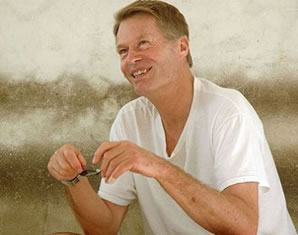
Jean-Marie Gustave Le Clézio (Nice, 13 april 1940)
De Ierse dichter Seamus Heaney werd op 13 april 1939 te County Derry, Noord-Ierland, geboren. Zie ook mijn blog van 13 april 2007 en ook mijn blog van 13 april 2008.
From The Frontier Of Writing
The tightness and the nilness round that space
when the car stops in the road, the troops inspect
its make and number and, as one bends his face
towards your window, you catch sight of more
on a hill beyond, eyeing with intent
down cradled guns that hold you under cover
and everything is pure interrogation
until a rifle motions and you move
with guarded unconcerned acceleration—
a little emptier, a little spent
as always by that quiver in the self,
subjugated, yes, and obedient.
So you drive on to the frontier of writing
where it happens again. The guns on tripods;
the sergeant with his on-off mike repeating
data about you, waiting for the squawk
of clearance; the marksman training down
out of the sun upon you like a hawk.
And suddenly you’re through, arraigned yet freed,
as if you’d passed from behind a waterfall
on the black current of a tarmac road
past armor-plated vehicles, out between
the posted soldiers flowing and receding
like tree shadows into the polished windscreen.
Song
A rowan like a lipsticked girl.
Between the by-road and the main road
Alder trees at a wet and dripping distance
Stand off among the rushes.
There are the mud-flowers of dialect
And the immortelles of perfect pitch
And that moment when the bird sings very close
To the music of what happens.
Seamus Heaney (County Derry, 13 april 1939)
De Duitse dichter en schrijver Stephan Hermlin werd als zoon van joodse immigranten geboren op 13 april 1915 in Chemnitz. Zie ook mijn blog van 13 april 2007 en ook mijn blog van 13 april 2008.
Uit: Ein Gruß für Aragon. Zum 60. Geburtstag
„Aragons ungeheures Talent hätte für zehn bedeutende Dichter gereicht. Aber dieses Übermaß an Begabung konzentrierte sich gerade in ihm, gleichermaßen verfügte er über den Ausdruck von Zärtlichkeit und Hohn, von Verzweiflung und Zuversicht, er geht im gleichen Augenblick über die Sprache des Alltags und die der höchsten Kunst, er konnte von den Verletzungen aller und seinen eigenen reden, er stellte sich zur Schau und wahrte sein Geheimnis, er trug Masken; er war brillant und dunkel, er war das, was man nicht erwartet hatte, nämlich immer der gleiche, er besaß die schreckliche Kraft der Verführung, auch hielt er Treue der Sache, der er sich vor langer Zeit verschrieben hatte. Eigentlich war es zuviel. Ich kannte viele, die ihn bewunderten. Geliebt haben ihn wahrscheinlich nicht so viele. Liebt man denn, was man nicht sein kann?
Stephan Hermlin (13 april 1915 – 6 april 1997)
De Turkse dichter Orhan Veli (eig. Orhan Veli Kanık) werd geboren op 13 april 1914 in Izmir. Zie ook mijn blog van 13 april 2007 en ook mijn blog van 13 april 2008.
Fine Days
These fine days have been my ruin.
On this kind of day I resigned
My job in “Pious Foundations.”
On this kind of day I started to smoke
On this kind of day I fell in love
On this kind of day I forgot
To bring home bread and salt
On this kind of day I had a relapse
In my versifying disease.
These fine days have been my ruin.
If only I could set sail
How pleasant, oh dear God, how pleasant
To journey on the blue sea
To cast off from shore
Aimless as thought.
I would set sail to the wind
And wander from sea to sea
To find myself one morning
In some deserted bay.
In a harbor large and clean
A harbor in coral isles
Where in the wake of clouds
A golden summer trails.
The languid scent of oleasters
Would fill me there
And the taste of sorrow
Never find that place.
Sparrows would nest in the flowered
Eaves of my dream castla
The evenings would unravel with colors
The days pass in pomengrate gardens.
Orhan Veli (13 april 1914 – 14 november 1950)










